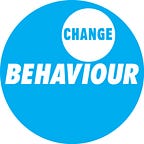A big step forward for behaviour change… and for us at Behaviour Change!
We’re chuffed to bits to announce that we’ve been chosen to work with WRAP on a long-term basis, on their new Behaviour Change Interventions framework. This news follows five years of collaboration with WRAP on the relaunch of the national Recycle Now brand and a series of innovative interventions on recycling — putting us in a great position to achieve real impact on waste, resources and the circular economy, all key challenges on the road to Net Zero.
We’ve worked on a lot of things we’re proud of, and we don’t crow about them often — but this has to be one of the best opportunities that’s come our way in the last eleven years (and it goes without saying we’re excited to spend more time in our high-vis vests, out at dawn with the waste teams, debating the benefits of co-mingled versus kerbside sort recycling systems). When we set up back in 2009, behaviour change wasn’t a widely known field: we’ve watched it explode since then, attracting enthusiasm and cynicism alike. We’ve long championed the role that behaviour change will have to play in achieving sustainable lifestyles, and the fact that an organisation of WRAP’s position has now procured long-term behaviour change partners is an important moment for the incorporation of behaviourally-informed thinking into business as usual.
We already know that more than 60% of the UK’s emissions reductions will involve a level of behaviour change, and when it comes to addressing these challenges, WRAP is a leader in the field. More than six out of ten of us now describe ourselves as committed recyclers, compared to less than half when the Recycle Now campaign began in 2004. The charity recognised years ago that achieving impact means moving beyond communications campaigns and into evidence-backed interventions that make it easier for people to make sustainable choices in the real world. Their behaviour change work covers four areas — recycling, plastics, food waste and fashion — where citizen behaviour will be key.
More broadly, we’d like to think that tides are turning. It feels, anecdotally at least, as though the sustainability conversation and accompanying action and commitments have stepped up a gear (though the changes we’ve seen in 2020 don’t yet equal long-term change in the UK’s travel habits, meat consumption, or fashion purchasing, to name just a few areas where urgent changes will be needed). Businesses, the public sector and society at large have work to do adapting to the future: plans are rapidly developing around the introduction of a DRS (Deposit Return Scheme) and EPR (Extended Producer Responsibility). These could signal a step change for resource use, working at a systemic level and needing corresponding behaviour change from individuals too. These new national schemes and legislation will be powerful tools for making sustainable lifestyles the norm at a systemic level: we couldn’t be more excited to be continuing our work with WRAP to bring citizens on board too.
